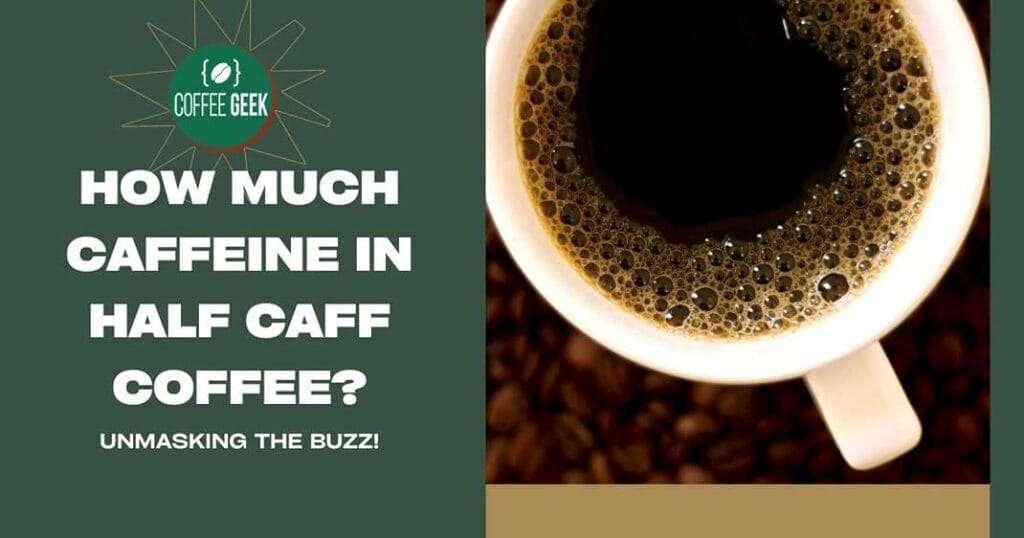Half-caff coffee has become increasingly popular among coffee lovers who want to enjoy the taste and aroma of their favorite beverage while cutting back on caffeine intake.
It’s a blend that combines regular and decaffeinated coffee beans, providing the perfect balance for those who may be sensitive to caffeine or looking to reduce its consumption without giving up coffee altogether.
The process of decaffeination removes most of the caffeine from the coffee beans, while still preserving the desirable flavors and aroma. How much caffeine in half caff coffee?
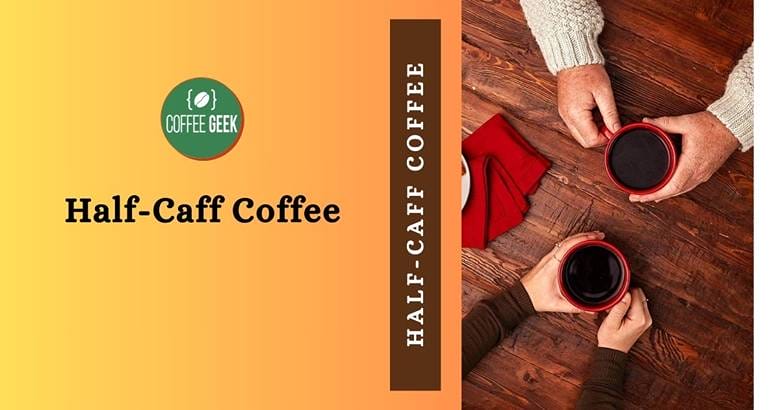
When combined with regular coffee beans, the result is a cup of half-caff coffee that contains around 50 mg of caffeine in an 8 oz serving, which is nearly half the amount found in a typical cup of regular coffee.
This allows you to indulge in your daily coffee routine without worrying about the potentially adverse effects of consuming too much caffeine.
Key Takeaways
Half-caff coffee is a blend of regular and decaffeinated beans, offering a lower caffeine content for sensitive individuals.
An 8 oz serving of half-caff coffee contains approximately 50 mg of caffeine, compared to 95 mg in regular coffee.
Consuming half-caff coffee allows you to enjoy the taste and aroma of coffee while reducing potential health implications related to caffeine intake.
How Much Caffeine in Half Caff Coffee?
So, you’re a coffee lover who wants a bit of caffeine without overdoing it? Let me introduce you to half-caff coffee.
Half-caff coffee is a blend of regular and decaffeinated coffee, which means it has less caffeine than your usual cup of java.
This is perfect for those who want a little pick-me-up without the jitters that can come from too much caffeine.
When it comes to caffeine content, an 8 oz cup of half-caff coffee has about 50 mg of caffeine.
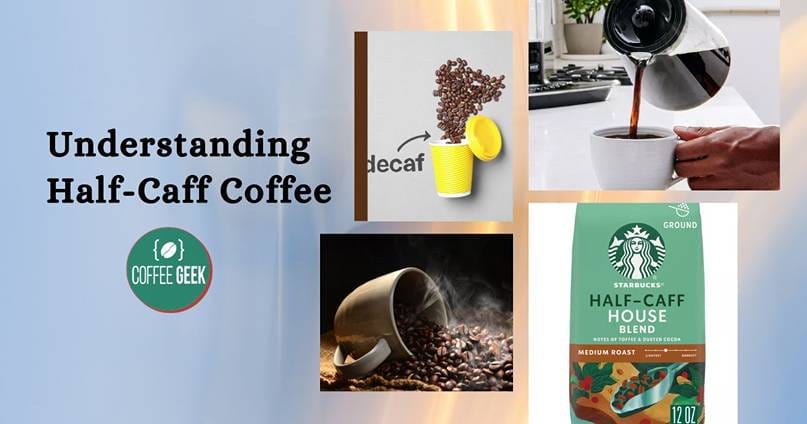
To put it into perspective, a regular cup of coffee contains about 95 mg of caffeine, while a cup of decaf has around 2 mg.
This makes half-caff a great option if you’re looking to reduce your caffeine intake without giving up coffee altogether.
You might be wondering if half-caff coffee tastes any different than regular or decaf coffee. Well, since it’s a 50/50 mix, the taste can vary depending on what type of beans and roast levels are used.
However, most coffee aficionados agree that half-caff provides a satisfying coffee experience.
Now, you might want to pay attention to your daily caffeine intake. It’s important to know that up to 400 mg of caffeine a day is considered safe for most adults.
But don’t forget that everyone’s sensitivity to caffeine differs, so listen to your body and adjust accordingly.
In summary, half-caff coffee is a delightful blend that offers coffee lovers the best of both worlds: the taste of coffee with a more moderate caffeine kick.
So go ahead and enjoy your half-caff, knowing you’re making a smart choice for both your taste buds and your body!
Decoding Decaffeination
Decaffeination Process
Decaffeination is the process of removing caffeine from coffee beans, allowing you to enjoy your favorite beverage without the jittery side effects.
When it comes to decaffeinated coffee, it’s important to understand that the decaffeination process can strip away some of the natural flavors and aromas, but with the right techniques, you can still enjoy a delicious cup of coffee.
There are several methods used to decaffeinate coffee beans, but the most common involve using solvents to extract the caffeine.
These solvents are carefully chosen to effectively remove caffeine while preserving the beans’ flavors and aromas as much as possible.
Common Solvents Used
Two popular solvents for decaffeination are methylene chloride and ethyl acetate. Methylene chloride is a powerful solvent that dissolves the caffeine within the coffee beans.
Ethyl acetate, on the other hand, is a more natural solvent derived from fruits. It is known as the “natural” method of decaffeination.
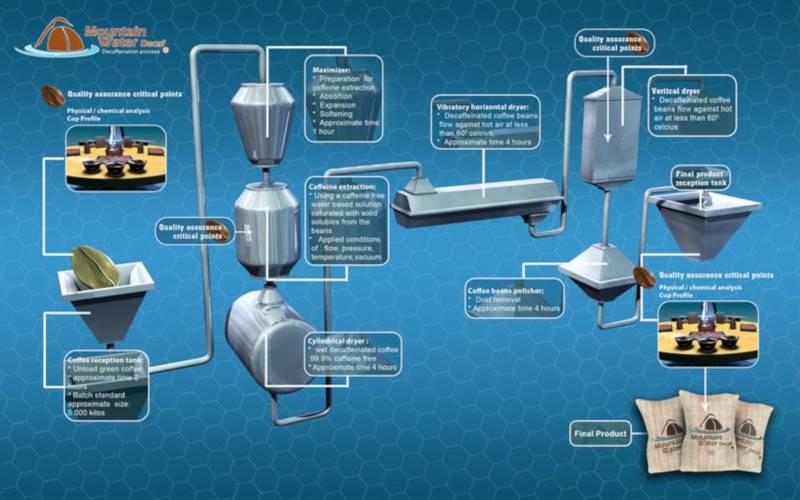
Another decaffeination technique that doesn’t rely on chemical solvents is the water process.
This method immerses coffee beans in hot water to dissolve the caffeine, then the water is passed through a filter to remove the caffeine, and the beans are re-immersed in the water to reabsorb the coffee flavors and aromas.
Whichever method is used, decaf coffee should have at least 97% of its caffeine removed according to the US standard, or 99.9% caffeine-free by mass per the EU standard.
So, next time you reach for a cup of decaf coffee, remember the process it has gone through to give you that same great taste without the unwanted caffeine kick.
Caffeine Content Comparison
Half-Caff Vs Regular
Half-caff coffee is a 50/50 blend of regular and decaf coffee (caffeinated and decaffeinated coffee). In an 8 oz cup of regular coffee, there’s about 95 mg of caffeine.
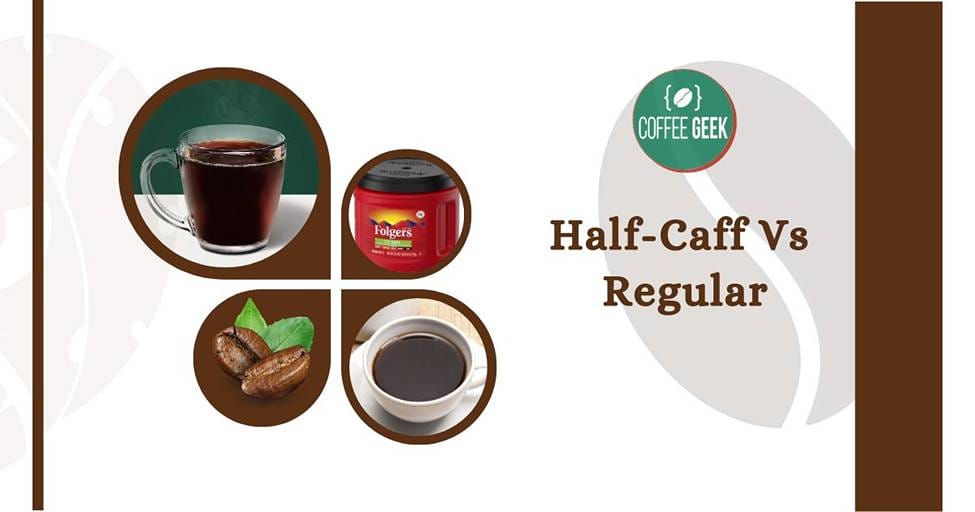
On the other hand, an 8 oz cup of half-caff coffee contains approximately 47.5 mg of caffeine. So yes, half-caff really has about half the caffeine of regular coffee.
Half-Caff Vs Decaffeinated coffee
Decaf coffee isn’t entirely caffeine-free; an 8 oz cup still contains about 2 mg of caffeine.
When comparing half-caff coffee to decaf, the caffeine difference is evident – around 45.5 mg more caffeine in half-caff per 8 oz cup.
Half-Caff Vs Espresso
Espresso is a concentrated coffee with a higher caffeine content per ounce. A 1 oz shot of espresso has around 63 mg of caffeine.
Comparing it to half-caff, you’ll find that an 8 oz cup of half-caff has less caffeine than two espresso shots.
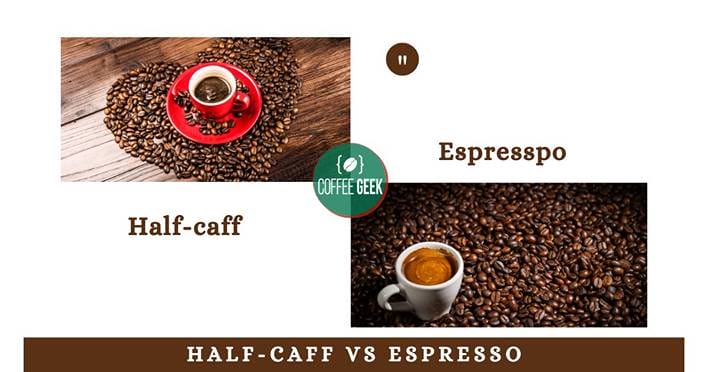
Half-Caff Vs Tea
Caffeine content in tea varies widely depending on the type. For example, an 8 oz cup of black tea has about 47 mg of caffeine, while an 8 oz cup of green tea contains around 28 mg.
That means half-caff coffee has a similar caffeine content to black tea and slightly more caffeine than green tea.
Half-Caff Vs Soda
Soda typically contains less caffeine than coffee and tea. A 12 oz can of cola has around 34 mg of caffeine. Half-caff coffee has more caffeine per 8 oz cup than a 12 oz can of soda.
Comparison With Instant Coffee
Instant coffee is another popular choice for those looking to cut down their caffeine intake. An 8 oz cup of instant coffee contains around 62 mg of caffeine.
Half-caff coffee has less caffeine than instant coffee, making it a better option if you want to reduce your caffeine use without giving it up entirely.
Health Implications of Half-Caff Consumption
Potential Side Effects
While half-caff coffee has less caffeine compared to a regular cup (about 95 milligrams), it still contains some caffeine.
You may experience side effects if you’re sensitive to caffeine, such as restlessness, anxiety, or a rapid heartbeat.
Additionally, consuming large amounts of half-caff coffee can still lead to caffeine addiction and withdrawal symptoms, as well as influence your sleep patterns.
Benefits for Body
On the positive side, reduced caffeine intake from half-caff coffee has potential benefits for your body.
For example, some studies suggest that moderate caffeine use can lower the risk of developing type 2 diabetes and heart disease.
Moreover, switching to half-caff may help to manage your caffeine sensitivity better, which can improve your overall well-being.
Impact on Mental Health
Half-caff coffee can have a positive effect on mental health, as it offers a less intense caffeine boost while still keeping you alert.
According to a review, moderate caffeine consumption can help to reduce the risk of stroke, dementia, and depression in women, and Parkinson’s Disease in men.
However, keep in mind that higher caffeine intake might increase the risk of sleep disorders and anxiety disorders, especially in children and adolescents.
Half-Caff Coffee during Pregnancy
For pregnant women, carefully monitoring caffeine consumption is essential, as excessive caffeine intake could have negative side effects for both the mother and the baby.
Switching to half-caff coffee might be a safe alternative, as it allows for reduced caffeine intake without completely cutting out your favorite beverage.
However, it’s crucial to consult with your healthcare provider before making any changes to your diet during pregnancy and breastfeeding.
| Coffee Type | Caffeine Content (per 8 oz cup) | Factors Affecting Caffeine Content |
|---|---|---|
| Regular Coffee | ~95 mg | Type of coffee bean, roast level, brewing method, and coffee-to-water ratio. |
| Decaf Coffee | ~2 mg | Decaffeination process and bean type (Arabica or Robusta). |
| Half-Caff Coffee | ~47.5 mg | Blend ratio of regular and decaf beans, as well as other factors mentioned for regular coffee. |
Practical Aspects of Half-Caff Coffee
Brewing Process
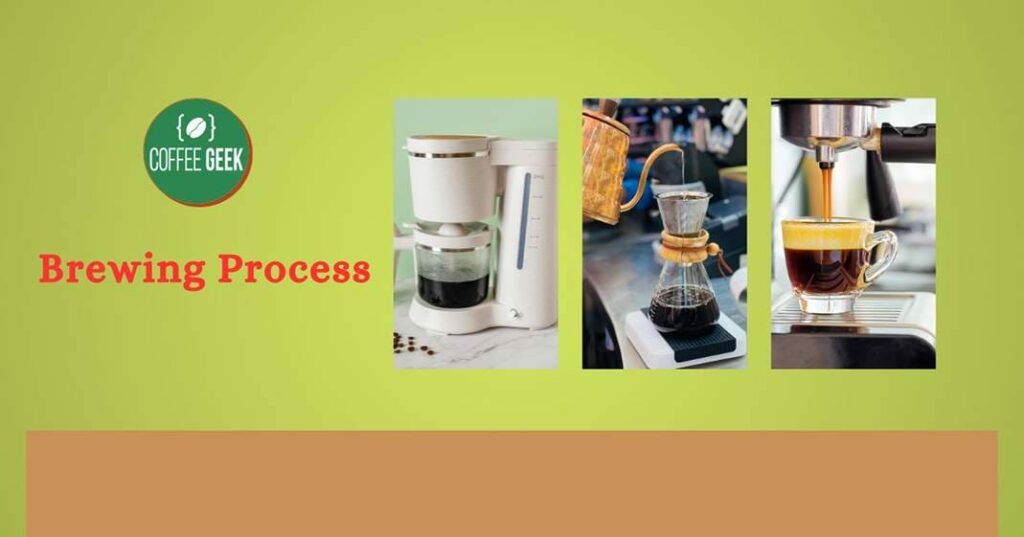
Brewing half-caff coffee isn’t much different from brewing regular coffee. You can use your preferred brewing method, such as drip, pour-over, or espresso.
Just remember to mix equal parts of regular and decaf coffee beans before grinding them. This will give you the right balance of caffeine and flavor.
By adjusting the ratio, you can customize your half-caff experience according to your taste preferences and caffeine needs.
Taste Experience
When it comes to taste, half-caff coffee can be almost indistinguishable from regular coffee, as long as the beans and the brewing process are of high quality.
Some people even find that half-caff blends offer a smoother and less acidic taste, making it a more enjoyable drink.
Whether you’re a casual coffee drinker or a seasoned coffee enthusiast, half-caff coffee can be a pleasant option for those looking to reduce their caffeine intake without sacrificing taste.
Understanding Bean Varieties
Bean variety plays a significant role in the caffeine content and taste of half-caff coffee.
It’s essential to choose both regular and decaf beans that complement each other in flavor.
Experiment with different combinations of bean varieties, origins, and roasting methods to find the perfect blend according to your palate.
Locating Coffee Shops
Finding coffee shops that serve half-caff coffee might be a bit harder than finding ones that serve regular or decaf coffee. However, many specialty coffee shops are more likely to offer this option.
Don’t hesitate to ask your local barista if they can make a personalized half-caff blend for you.
They usually have a good understanding of the beans they serve and can suggest the best combinations to suit your preferences.
Half-Caff Coffee at Starbucks
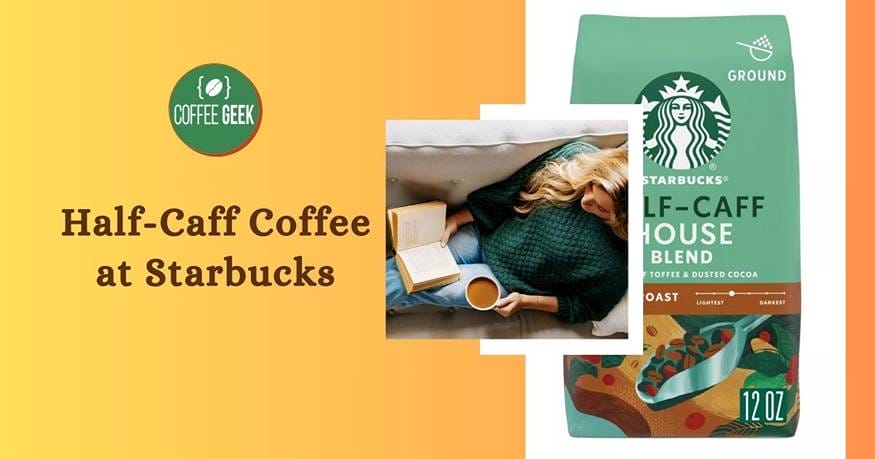
Even popular chains like Starbucks offer half-caff coffee options.
When you visit a Starbucks location, you can request a half-caff brew by simply asking the barista to mix equal parts of regular and decaf coffee beans.
Keep in mind that Starbucks also offers a variety of coffee blends, allowing you to experiment with different flavor profiles and discover your favorite half-caff blend.
Conclusion
Half caff coffee, also known as half caf or half calf, is a popular choice for those who enjoy the taste and ritual of drinking coffee but are mindful of their caffeine intake.
This type of coffee is made by blending equal parts caffeinated and decaffeinated coffee beans. The result is a morning cup that provides an energy boost without the high doses of caffeine that can affect the central nervous system or raise blood pressure.
Frequently Asked Questions
What’s the caffeine content in a typical half caff coffee – is it decaf coffee?
In a typical 8 oz half caff, you’ll find around 50 mg of caffeine. This is because half caff is made by combining equal parts regular coffee (around 95 mg of caffeine) with decaf coffee (around 2 mg of caffeine) which is roughly half.
Is it safe drinking coffee half coffee during pregnancy?
It’s recommended to limit caffeine intake during pregnancy, but having some caffeine is generally considered safe. The Mayo Clinic states that up to 200 mg of caffeine per day should be safe for most pregnant women.
Since half-caff coffee has a relatively lower caffeine content, it can be a suitable option to help reduce your caffeine use during pregnancy.
How does half-caff coffee compare to regular coffee in terms of caffeine?
Half caff contains only about 50% of the caffeine found in regular coffee, making it a good choice if you want to enjoy the taste of coffee without consuming too much caffeine.
While a regular 8 oz cup has around 95 mg of caffeine, the same size half-caff contains approximately 50 mg of caffeine.
Which brands offer the best half-caffeine coffee?
There are several brands that offer half-caff coffee, and taste preferences vary among individuals. Some popular options include Green Mountain Coffee Roasters, Folgers, and Caribou Coffee, among others.
It’s a good idea to try out different brands to find the one that suits your taste buds the most.
What’s the caffeine amount in a 12 oz half caff beverage?
In a 12 oz serving of half-caff, the caffeine content would be around 75 mg. This is calculated by taking the 50 mg of caffeine found in an 8 oz cup and multiplying it by 1.5 (12 oz is 1.5 times larger than 8 oz).
Are there any half-caff coffee K-cups available?
Yes, there are half-caff coffee K-cups available, offering the convenience of brewing a single cup of coffee with half the caffeine.
Some popular options include Green Mountain Coffee Roasters Half-Caff K-Cups and Folgers Half-Caff K-Cups.
These K-cups can be found online or at your local grocery store.

